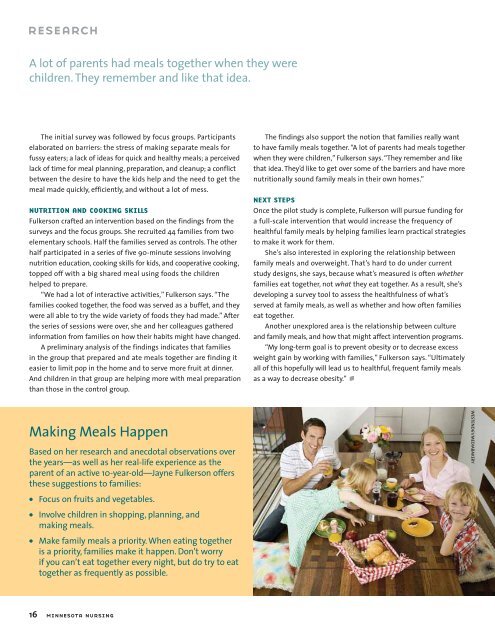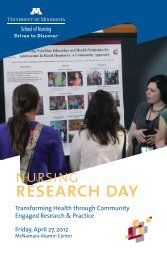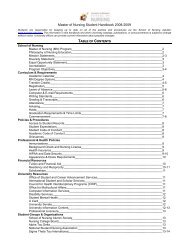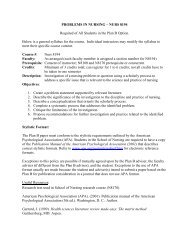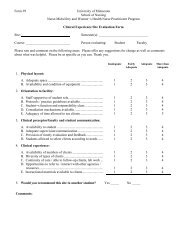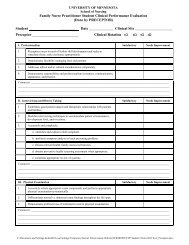New SoN Center educates tomorrow's geriatric nurses - School of ...
New SoN Center educates tomorrow's geriatric nurses - School of ...
New SoN Center educates tomorrow's geriatric nurses - School of ...
You also want an ePaper? Increase the reach of your titles
YUMPU automatically turns print PDFs into web optimized ePapers that Google loves.
esearch<br />
A lot <strong>of</strong> parents had meals together when they were<br />
children. They remember and like that idea.<br />
The initial survey was followed by focus groups. Participants<br />
elaborated on barriers: the stress <strong>of</strong> making separate meals for<br />
fussy eaters; a lack <strong>of</strong> ideas for quick and healthy meals; a perceived<br />
lack <strong>of</strong> time for meal planning, preparation, and cleanup; a conflict<br />
between the desire to have the kids help and the need to get the<br />
meal made quickly, efficiently, and without a lot <strong>of</strong> mess.<br />
NUTRITION AND COOKING SKILLS<br />
Fulkerson crafted an intervention based on the findings from the<br />
surveys and the focus groups. She recruited 44 families from two<br />
elementary schools. Half the families served as controls. The other<br />
half participated in a series <strong>of</strong> five 90-minute sessions involving<br />
nutrition education, cooking skills for kids, and cooperative cooking,<br />
topped <strong>of</strong>f with a big shared meal using foods the children<br />
helped to prepare.<br />
“We had a lot <strong>of</strong> interactive activities,” Fulkerson says. “The<br />
families cooked together, the food was served as a buffet, and they<br />
were all able to try the wide variety <strong>of</strong> foods they had made.” After<br />
the series <strong>of</strong> sessions were over, she and her colleagues gathered<br />
information from families on how their habits might have changed.<br />
A preliminary analysis <strong>of</strong> the findings indicates that families<br />
in the group that prepared and ate meals together are finding it<br />
easier to limit pop in the home and to serve more fruit at dinner.<br />
And children in that group are helping more with meal preparation<br />
than those in the control group.<br />
The findings also support the notion that families really want<br />
to have family meals together. “A lot <strong>of</strong> parents had meals together<br />
when they were children,” Fulkerson says. “They remember and like<br />
that idea. They’d like to get over some <strong>of</strong> the barriers and have more<br />
nutritionally sound family meals in their own homes.”<br />
NEXT STEPS<br />
Once the pilot study is complete, Fulkerson will pursue funding for<br />
a full-scale intervention that would increase the frequency <strong>of</strong><br />
healthful family meals by helping families learn practical strategies<br />
to make it work for them.<br />
She’s also interested in exploring the relationship between<br />
family meals and overweight. That’s hard to do under current<br />
study designs, she says, because what’s measured is <strong>of</strong>ten whether<br />
families eat together, not what they eat together. As a result, she’s<br />
developing a survey tool to assess the healthfulness <strong>of</strong> what’s<br />
served at family meals, as well as whether and how <strong>of</strong>ten families<br />
eat together.<br />
Another unexplored area is the relationship between culture<br />
and family meals, and how that might affect intervention programs.<br />
“My long-term goal is to prevent obesity or to decrease excess<br />
weight gain by working with families,” Fulkerson says. “Ultimately<br />
all <strong>of</strong> this hopefully will lead us to healthful, frequent family meals<br />
as a way to decrease obesity.”<br />
Making Meals Happen<br />
Based on her research and anecdotal observations over<br />
the years—as well as her real-life experience as the<br />
parent <strong>of</strong> an active 10-year-old—Jayne Fulkerson <strong>of</strong>fers<br />
these suggestions to families:<br />
• Focus on fruits and vegetables.<br />
• Involve children in shopping, planning, and<br />
making meals.<br />
• Make family meals a priority. When eating together<br />
is a priority, families make it happen. Don’t worry<br />
if you can’t eat together every night, but do try to eat<br />
together as frequently as possible.<br />
WESTEND61/MEDIABAKERY<br />
16 minnesota nursing


